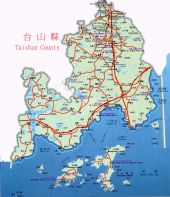
Taishan or Hoy Sun (Hoi Sun) in the local dialect was part of Xinhui (╴╴唳╴╴蝮╴) until 1499 when Xinhui's borders were redrawn resulted in the formation of a new county from the area on its southwest. The new county, Xinning (╴╴啣祐), is generally accepted to be Taishan's forerunner. However, one writer said this Xinning was located west of present day Xinxing (╴╴啗╴╴). On the other hand, the writer didn't see fit to enlighten us as when was present day Taishan (Xinning) established. We'll continue to accept the general consensus until proven otherwise.
The name was changed to Taishan in 1914 to avoid confusions with counties having the same name in other provinces. However, this switch creates another problem. The name in pinyin is exactly the same as China's most famous mountain in Shandong (撅望╴望陸撅╴). As a test go to any search engine, do a search on Taishan and see what happens.
 Taishan is generally accepted as the county with the most overseas-Chinese. Up to and until the early 1970's it's dialect, Taishanese, was the de facto Chinese language of North America's Chinatowns. At the time for a person who didn't speak Taishanese it was next to impossible to find work in a Chinese establishment.
Taishan is generally accepted as the county with the most overseas-Chinese. Up to and until the early 1970's it's dialect, Taishanese, was the de facto Chinese language of North America's Chinatowns. At the time for a person who didn't speak Taishanese it was next to impossible to find work in a Chinese establishment.
This created an unique problem for the boomer generation. The language of their parents are Taishanese yet at Chinese school (99.9% of us attended Chinese school at one time or another) the teachers taught in Cantonese. So what's the problem you ask? There's no problem until the student started to do the assignments, if my experience is any indication, generally it's the night before and always encountered at least one new and forgotten word. What to do? Ask your parents. What's more logical?
The next day in class, the student may be asked to recite the previous week's lesson in Cantonese or the teacher may randomly tested students on the new words from the previous lesson. The Taishanese speaking students would find their lesson with their parents on the previous evening resulted in incorrect answers. However, because of similarities between the two dialects the parents' pronunciations were not always wrong according to the teacher. This lack of consistency just added to the confusion of whether to consult with one's parents or not.
One would think this only happened to those students who asked their parents for help. Those who didn't wouldn't have this problem. But this is not really true because most parents liked to monitor their children's progress and reviewed the school works at home. Their good intention would started to confused the non-confused and compounded for those who were.